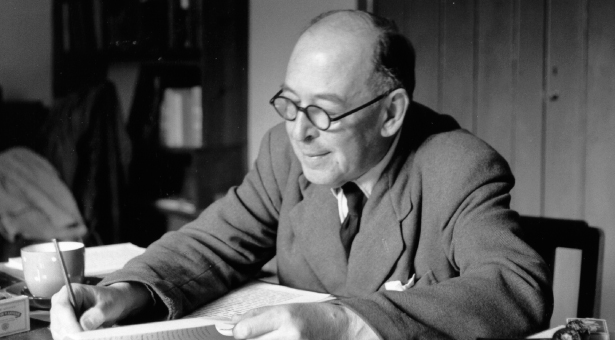Arts & Culture Faithful Creativity
C.S. Lewis in World War II
Discussion Brings Lewis Scholars — and a Crowd — to Campus
By Jeffrey Overstreet (jeffreyo@spu.edu)
 When the BBC invited C.S. Lewis to lecture about English literature, he declined. Instead, he gave radio lectures on morality and theology.
Photo used by permission of the Marion E. Wade Center, Wheaton College, Wheaton, Illinois.
When the BBC invited C.S. Lewis to lecture about English literature, he declined. Instead, he gave radio lectures on morality and theology.
Photo used by permission of the Marion E. Wade Center, Wheaton College, Wheaton, Illinois.
Imagine it's 1941. Germany has bombed England, leaving it scarred and shaken. Servicemen of the British Royal Air Force gather in a pub to lift their spirits (no pun intended). Their ruckus drowns out the sound of the radio.
"Quiet! Mr. Lewis is coming on!"
The soldiers hush. You could hear a pin drop into a pint of beer. A familiar voice breaks through radio static. (In Britain, only Winston Churchill's voice is better known.) He's not ranting about Germany. He's talking about how humankind is born with an innate sense of right and wrong.
That voice belongs to C.S. Lewis, whose short, provocative BBC broadcasts would become the building blocks of his book Mere Christianity.
A war-torn nation listening to a theologian? Unlikely, but true.
Listeners were just as attentive when 300 people in Seattle Pacific University's Upper Gwinn Commons quieted down for a panel discussion of Justin Phillips' book C.S. Lewis in a Time of War (HarperOne, 2006) on October 3, 2011.
In fact, they heard that wartime radio story related by a special guest: C.S. Lewis scholar Christopher Mitchell, director of the Marion E. Wade Center at Wheaton College, where a research collection of Lewis' works is preserved.
Author and broadcaster Dick Staub hosted the gathering, welcoming Mitchell, the Reverend Earl Palmer, and SPU Fine Arts Marketing Associate Kim Gilnett for a live recording of Staub's Kindlings Muse radio show.
Staub described how the BBC's wartime audience — one-third embracing Christianity, one-third neutral, and one-third hostile toward religion — were unmoved by speeches from clergy because they "would talk about things that were theological, dogmatic, doctrinaire, and didn't connect with the people."
Palmer praised Lewis for his four-talk series, "Right and Wrong: A Clue to the Meaning of the Universe," the first of his BBC broadcasts on faith that ran for almost three years. Lewis did not start by condemning Nazis or by evangelizing, said Palmer: "He begins by describing common quarrels, like two people fighting over a bus seat." Lewis revealed, carefully and strategically, that "every human being knows of a durable, a real, a permanent rightness," Palmer added. "What is the sense in saying the enemy is wrong unless right is the real thing?"
Gilnett, who was part of a team that oversaw the restoration of the Kilns (Lewis' former Oxford home), shared anecdotes about Lewis' "patriotic and passionate" wartime service: his challenging journeys to address the RAF; his work as a warden, taking in children who moved from London into the country; and his prolific correspondence.
SPU junior Lauren Wilford was impressed to learn that while 4,000 letters from Lewis have been preserved, many more were lost. "The fact that he burned the letters that people sent to him — that was so interesting, because we relish the fact that we have his letters," she says.
Gary Stueckle '75, a teacher who brought students from King's High School in Seattle, says, "This was a great opportunity for students to get broader exposure to Lewis' work."
"That's the next generation of Lewis scholars, right there," said Ken Cornell, SPU's director of
alumni and parent relations, who sat with the high school students. "This event is adding to Lewis
scholarship. And we get to watch it happen."
Perhaps no one was more enthusiastic than Mike Macdonald, professor emeritus. "I wouldn't ss this," he said. "My friends know that if I were sent to a desert island and could only take three books with me, I'd take three copies of Mere Christianity!"
Visit thekindlings.com to hear the podcast.
